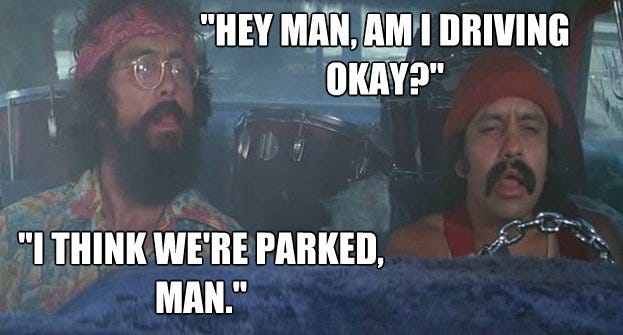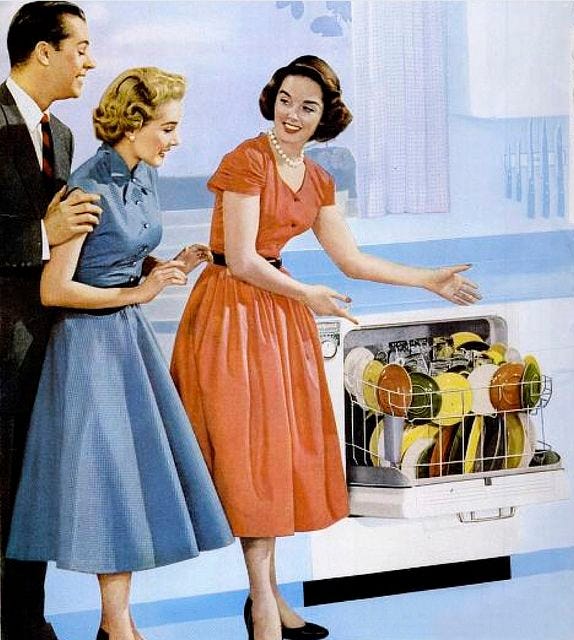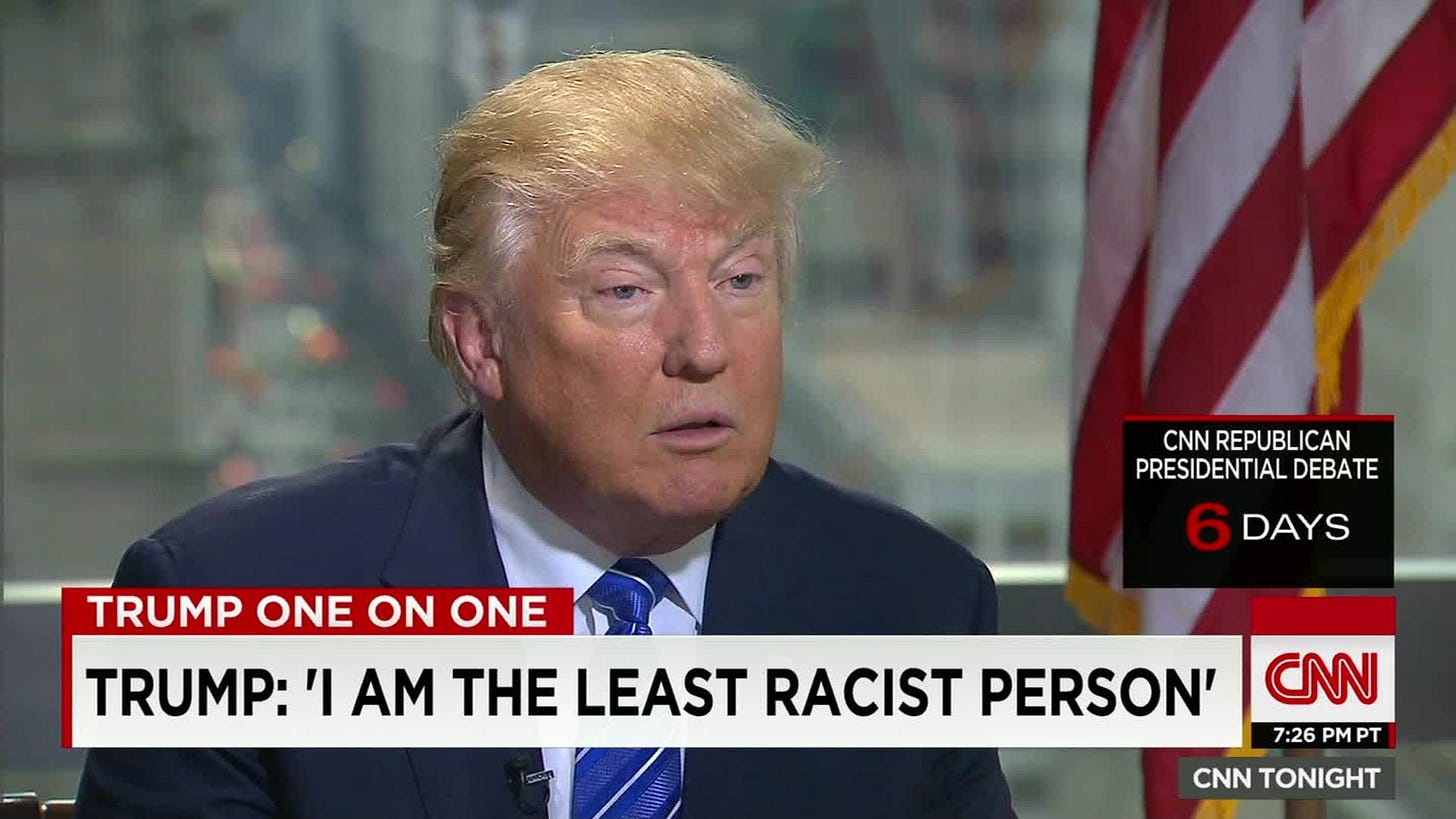I (accidentally) went undercover to debate a Trumper, and this is how I cracked him (in 10 steps)
and why all they’re all lying when they say they can tell
PART I
On the sunset of President Trump’s sad $145 million birthday parade, the corresponding nationwide “No Kings” protests, escalating ICE raids, and now the assassination of a democratic leader in Minnesota, it doesn’t feel farfetched to say that this week presents the widest chasm I’ve felt in a while between myself and supporters of our 47th president. Which is why this feels important:
A few weeks ago, I posted a 14 second video to Instagram that has now been viewed just under a million times. The backlash has ranged from dismissive to horrifying, with some viewers arguing that I’m a bald faced liar, while others have jumped straight into my DMs to tell me that they hope I meet a bitter and violent end.
And why?
The video features some of the opening words from The Charlie Daniels Band’s “The Devil Went Down to Georgia:”
I guess you didn't know it, but I am a fiddle player too
And if you'd care to take a dare, I'll make a bet with you
Now you play a pretty good fiddle, boy, but give the Devil his due
I'll bet a fiddle o' gold against your soul 'cause I think I'm better than you
I paired the flattering slow zoom in the afternoon light with the caption “When the Trumper at the RV park tries to bait me about ‘those mentally ill pronoun people’ but he doesn’t know I’m one of them.”
Surprisingly, my top criticism has not been that I positioned myself on the side of the devil (who ultimately loses the bet in the original song), but that it is impossible for me, a trans man, to have bested a Trump supporter in open debate.
“Just because you will yell louder and refuse to acknowledge anything he says doesn’t mean you’re better at arguing,” says the definitely-not-worryingly-named probably_not_a_serial_killer.
Most of the other nay-sayers have no surface-level problems with my claim, other than that it is unrealistic to say that a cisgender man spent a couple of hours in my presence without clocking that I was once a girl scout.
“We can tell,” says infantleech.
“We all know, within milliseconds of looking at you,” says mr.criddle.
“Didn’t happen,” says i_mck_43.
And while it’s impossible to verify the encounter (despite the historic nature of the event, no news vans arrived on the scene to document it), I was so energized afterward that I practically sprinted back to our front door to write down as much as I could. This is because a lot of my critics are right– I didn’t defeat a Trump supporter in a verbal bare knuckle brawl. That approach has never worked for anyone ever at any point in human history. What I did is arguably much harder, and it gave me hope for a mutual way forward, even in the face of a time where we’re told at every opportunity that the gap between us is too wide to breach.
So let’s get into it.
PART II
It started with Jimmy Buffet.
More specifically, it started with Jimmy Buffet decor. It caught us by surprise as my husband and I rounded the last corner on our morning walk in the RV park, our hands wrapped around matching camping mugs filled to the brim with hot tea. The decor in question was a sign perched in the only window of a small, aging trailer, glowing in vibrant primary colors to let us know that it was “5 o’clock somewhere.” Framed by a macaw and a margarita and paired with a string of chili lights we’d noticed from the day before, the trailer owner's implied enthusiasm for the southern border was out of place only because we were physically about twenty miles from the northern one. Here in Washington state, we were surrounded by thick coastal forests and an ever-present fog. The only Mexican restaurant we’d braved tried to serve us nachos made with Kraft singles. We paused beneath a towering pine tree for a moment to take in the scene.
Even without this portal to Margaritaville, my husband Xilo (shy-low) and I are in the habit of taking our sweet time on walks. This was because we are four months into our new lives as nomads, and we’ve been staying in this particular park for the better part of two weeks. Strolling around the grounds with our tea isn’t just a chance to stretch our legs – it’s recon time. Mobile living is challenging, and there’s only so much you can learn on your own. How does everyone else lay out their sewage line? Store their water hoses? Level their rigs? And which spots in the park get the best sun? The most privacy? Being on friendly terms with our neighbors, and getting a good look at how they’re set up, we’ve learned, is as important to survival as any fancy equipment or YouTube tutorial.
“Hey there fellas, can I help you?”
Xilo and I jumped– not just because we didn’t know we were being watched, but because we consistently forget that the world sees the two of us as men. Trans people are often criticized for demanding that others refer to us as one gender or another, but the truth is that they usually go out of their way to tell us how they see us first. You started it, as they say.
“Sorry about that, brother– didn’t mean to stare. We love the chilis. Did you move them from where they were at yesterday?” I waved my hand in a way that felt masculine in my head but looked more “Jedi mind control” in practice. I hoped the “brother” wasn’t overselling it, but it was too late to go back on it now. Xilo, however, seemed entirely unconcerned.
“It looks great,” said my husband to the looming shadow in the trailer doorway. “No one around here decorates at all. But it’s important to let it feel like home, don’t you think?”
For the first time, we got a good look at our neighbor as he climbed down the steps toward us. He was robed from neck to heels in distressed Carhartt, and his graying stubbled mug was shaded by a Dallas Cowboys hat that looked like it had seen the naked face of war. My first guess was that he was probably my dad’s age – right in the “barely missed the draft for Vietnam” Boomer sweet spot. I braced for a less-than-neighborly reception. But instead…
“You really like it?” he asked, his hand lifting and resettling the brim of his hat as he swept back hair that I’m sure used to be there. “My wife is coming in this week and I wanted to get the place all set up for her. I keep moving everything around and I wasn’t sure if it looked alright.”
I let my shoulders relax. This could be a brief and adorable interaction after all. It doesn’t feel good to make sweeping judgements about the people in our ever-shifting periphery, but a life in hyper vigilance has made me jumpy. Transphobia is the reason (even with three masters degrees and 15 years of classroom experience) we don’t have stable employment anymore, the reason we feel safer living in a perpetual state of movement, and the reason why we were now hovering just a 20 minute drive from the Canadian border. We feel the walls closing in, and we know that our survival means staying alert and ready for confrontation.
We stood, as many men do, in a small semi circle with our arms crossed in front of us as we chatted. The first sign of trouble came when Xilo asked where he was from.
“Most recently I was staying up around the east side of Texas, right on the coast of the Gulf of America.”
I’m sorry.
The what?
From there, our suspicions were further confirmed.
He liked the PNW, he told us, though he could tell right away that Bellingham, the charming town where we’d spent the last couple of weeks making what felt like lifelong friends, was “full of mentally ill people.” How did he know? At Walmart, he told us, he’d seen a woman with blue hair wearing a tutu.
“Probably one of those pronoun people, you know?”
Xilo and I made brief eye contact. We had a decision to make. While my husband generally avoided conflict and diffused tension like an Olympic-level mediator, I came from a different life. In another time, I’d spent twelve years as a high school teacher in one of the most socially conservative parts of California. Nestled deep behind the Orange Curtain, I taught AP English to young adults living in the same neighborhood as the Real Housewives of Orange County. I’d survived school board meetings where mothers stood in front of microphones to argue that my presence in public education was an affront to God. I taught critical thinking and the craft of argumentation to a community that tried for more than two years to run me out on a rail. Sure I was rusty, but in my mind, I was already doing lunges and shoulder circles. I pleaded with my eyes. After a pause, Xilo gave me an almost imperceptible nod.
I had the all-clear to engage.
PART III
I told you from the jump that this was not going to be a cage fight, so if you’re looking for a “Top 10 one-liners that will eviscerate Trump supporters down to the marrow,” turn back now. Clever bumper sticker slays are fun, but they would miss the point here. I had a unique opportunity to use my position to dig into this guy’s psyche, learn as much as I could, and leave a bread crumb trail to reality. No one has ever had the spell of fascism broken by being dunked head first into ice water. This kind of conversation was my bread and butter, with the extra seasoning of operating as a secret agent man– literally. And by the time we said our goodbyes, Xilo and I both had this man (who started our conversation by calling Trump a ‘genius’) praising Obama, admitting that he was likely being manipulated by conservative media, and pledging (in earnest) to expand his world. So put down the brass knuckles for a moment and I’ll tell you exactly how we did it:
10. We slow-rolled and modeled vulnerability
What most people get wrong about debate is that you are not operating in a space in which there are “winners.” To “win” would assume that you’re on the floor of a high school auditorium with a microphone on your podium. There are no referees, and no one is keeping score. We’ve gotten so used to comment sections as battlegrounds that we’ve largely forgotten what we’re actually trying to do here. A well-timed zinger doesn’t leave your opponent with his head in his hands while FATALITY flashes across the screen, it usually just pisses them off, shuts them down, and leaves you both with mild gastrointestinal issues later.
Our actual goal isn’t to win, or even to see the guy across from us as an opponent. We want him to feel safe enough to be vulnerable. If he can be vulnerable, he’s more likely to be open to changing a pattern of thought. If he can’t be vulnerable, we all lose and I’ve let my tea get cold for nothing.
So we modeled it, starting with the only bit of common ground we had: our trailers. We ceded at the very beginning of our conversation that we still had a lot to learn, and that on our second week on the road, we’d accidentally flooded our entire rig as we waited in line at the DMV. After our example, he did the same. Apparently, just a few days before, he’d left the water line attached for too long and overfilled his tank, dropping out the whole bottom and cracking the liner.
It might not seem like much, but it was a huge start. We were all human, and we all made mistakes– it was a precedent we would need to be able to return to.
9. We found transitional “middle ground” topics
While I was itching to find my way back to pronouns, I knew that showing my hand too early was a bad call. What we really needed was to establish a neutral starting point: finding ideas and opinions where we both felt equally activated, and from the same side. This wasn’t hard, as he brought up the first one himself: weed.
He (correctly) assumed that Xilo and I partook in the occasional bong rip, and it sparked his curiosity. As a crane operator, he was– rightfully– pissed that his foreman was allowed to randomly drug test him for a substance that was legal within Washington state. They didn’t seem to care when he was up all night throwing back beers as long as he could drive to work in the morning. Why did it matter to them if he tried a 5mg gummy and a party size bag of cool ranch Doritos? He, as would become a returning theme throughout our talk, was 100% sure that Biden was on drugs throughout his tenure as president. Why weren’t they testing him?
I agreed, and took it a step further. Why weren’t we drug testing all politicians? Why were people like him being so heavily monitored and untrusted, while every sitting US senator could be passing bills on the daily while completely blown out on coke and ketamine?
“You see, that’s a great point,” he nodded. I was in.
Other “middle ground” topics that got him to grind his gears:
Alcohol consumption and cancer rates
Screen addiction
Early childhood education and access to child care
Nuclear energy
8. We didn’t bristle or take any “rage bait”
Though we were excited to see that he was open to suggestion, I don’t want to represent this man as a potential friend. He said plenty of bonkers things that made me crash out internally and forced a manual restart on my brain. After all, he spent this entire talk believing with his whole body that he was chatting to a couple of guys who were at least very close to just like him. As someone who spent most of my life as a very unfriendly-looking lesbian to this particular brand of guy, this was my first taste of in-person unfiltered bananas white man thoughts.
We’re talking “it was a mistake to allow women to leave the home” and “I don’t understand why you care about Mexican kids” level bananas. Our work was cut out for us.
As much as we wanted to, we didn’t let any of his Fox News Greatest Hits catch us off guard. He would say something shocking, and we just let it float by like it didn’t make our brains melt. This didn’t mean we weren’t going to address it, but that we weren’t going to let the intentionally inflammatory thing inflame us. Guys like him have been told for years now that anyone who disagrees with them is delicate and fragile– if we blink, it will be the only thing he sees.
Xilo and I have both spent the majority of our adult lives on the front lines of education. I went toe-to-toe with teenagers on the daily for more than a decade, and he lived in the Dominican Republic as a Peace Corps volunteer building preschools and helping neuter street dogs. There’s very little that can shake us when we’re ready to hold our ground. Like handling a student acting out in our classroom, we gentle parented the shit out of him.
7. We knew our thesis statement and stuck to it
Another mistake in the realm of healthy debate is to be imprecise with your goal. We had, at max, a couple of hours with this guy. We weren’t going to be able to tackle the laundry list of points that he had been spending his whole life missing – we were going to have to narrow it down. The thesis of the conversation made itself pretty clear after just a few minutes: ‘You are easier to control when you’re afraid.’ He told us very early on:
“All I care about is what is affecting me today, and whether or not I can put gas in my truck.”
With a background in oil and natural gas, we knew that his whole world revolved around economic stability, and that the fear of his industry being wiped out by environmentalism was top of mind. He worried for the young men he worked with, who were rat fucked if they got hurt out on his rig. He also worried for his wife, who worked long shifts as an ICU nurse and struggled to picture a life in retirement. When we talked through these anxieties with him, we didn’t make it about one political party or another, we tied it back to interests much larger than any of us. If we are kept afraid, we are easier to manipulate. They want us fighting.
It was easy to argue because we believe it too.
6. We never gave an inch on our values
The hardest moment of this experience came when we were comparing our areas of expertise. It was important that he knew that we listened to and valued his perspective, and we were genuinely enthusiastic to learn from him. This was when he asked what we considered ourselves “experts” in. It was our turn for vulnerability, and I took my chance to steer our talk closer to issues that would challenge him.
I told him that I’d spent the majority of my adult life as an educator, and that I worked for a long time with populations of students who were ignored and mistreated by the public school system. “A lot of my kids were the children of immigrants,” I said, “Black and brown students who get fucked by the system right from the start.” But as I started to explain what I meant, he cut me off.
“But why do you care?” he asked.
It was the first time Xilo and I were stunned into silence.
“Why do we care?”
“Yeah, why do you care about those people? Like me, if it doesn’t affect me, I’m not thinking about it.”
I spent a long time deciding if I was going to include this quote. This isn’t because I don’t think he and people like him should be held responsible for what they say, but because it felt unbelievable even as I was hearing it. But these were his exact words. He really asked me, in front of God, why I cared about “these people.”
“Because,” I said, “I loved all of my kids. I cared about every single one of them.”
Xilo jumped in:
“These are kids, man. They’re just kids.”
The look on his face was one I didn’t recognize until Xilo walked me through his perspective later. It looked like it was the first time this guy had ever considered that Black and brown children were children too. Something clicked that hadn’t clicked before.
“Yeah, I guess they are just kids,” he said back to us.
5. We redefined his own terms back to him
A good example of this is the concept of “family values.” When I mentioned earlier that one of his many sticking points was “women shouldn’t be in the workforce,” I wasn’t kidding. Despite having a working wife (and no children), he was adamant that there was no room in the working world for women. He was, I will reiterate, completely oblivious to the fact that he was making this point to two people who, until recently, had been seen by men like him as women ourselves.
“I just don’t think it’s right that we’ve forced women back to work when they should be at home.”
We let the rage float by.
“I understand completely,” I said. “I can’t even imagine what it must be like as a woman being forced into anything I don’t want to do. Isn’t it horrible that families can’t support themselves on just one income?”
4. We met him exactly where he was
You can’t get someone to open a door they don’t even see. As we talked, it became clearer that the chasm between us was an entirely manufactured one. The problem wasn’t that his brain was fundamentally broken, but that his reality had been built for him by people who knew they could profit from his fear.
“No one ever called Donald Trump a racist until he ran for president,” he said with the confidence of his full chest.
That’s not true. I knew Donald Trump was a racist when I was eleven years old, when I sat on my bedroom floor with stacks of my dad’s old newspaper comic anthologies and learned the social and political history of our country. People were calling Trump a racist in the 80s when he took out a full page ad against the Central Park Five in Newsday. People were calling Trump a racist in the 70s when he faced a lawsuit for discriminating against Black renters. Racism isn’t new territory for him – it’s central to the fabric of his story.
But the guy in front of us didn’t know that, because no one in his world was telling him that story. He was missing a huge piece of the puzzle, and it wasn’t an accident.
3. We kept his defenses down
The thing about talking to someone who is missing a big chunk of the overall picture is that you can’t just hold their eyelids back to make them see it. We treated our neighbor the way you might treat someone right on the edge of an existential crisis. Instead of challenging him head on, triggering the wall that was sure to snap up if he sensed he was in enemy territory, we skirted along the edge of his boundaries. Instead of pushing against him, we did our best to add new information. Yes, we said, it’s wild how so many people just believe the first thing they hear about Trump. Also, do you think there’s a chance it’s happening to all of us?
2. We used positive reinforcement
Men are generally not in the habit of praising each other for vulnerability, but Xilo and I did our best. Whenever our neighbor agreed that he might be missing something, or opened up to the suggestion that he start listening to or reading something new, we were ready to go with matched enthusiasm. We knew that it was unlikely this man was leaving our encounter a completely changed person, but it was clear we were gaining some solid ground. As we gray-walled his inflammatory nonsense, it started to lessen before it dissipated completely. Soon, he was admitting that while he didn’t believe in everything the administration did, he had a warm spot in his heart for the Obamas. And had we seen Leave the World Behind? It wasn’t bad, actually.
1. We returned, again and again, to who the real enemies are
We were never going to make a leftist out of our Dallas Cowboy, but I knew we had a common ancestor somewhere in our political lineages.
“It’s never really been left versus right,” I told him. I gestured first to the sky and then the ground. “It’s always them versus us.”
If there’s anything that could unite a Texas crane operator and two gay trans school teachers, it was going to be class consciousness, and I was right. “Who’s making money by keeping us apart?” and “Who profits when we’re afraid?” were the winning combinations of the morning, and it was where I left us when Xilo made pointed eye contact for the second time, signaling that it was time to wrap it up and head home.
“Don’t forget who’s really after us,” I reminded him as we exchanged our last handshakes.
Wrapping It Up
There’s no way to know if anything Xilo or I said to our neighbor will stick with him, and because of the nature of the algorithm, I have $500 that says he never sees a word of what I’ve written here. Ultimately, that’s the crux of the problem – we live in different realities, separated by systems that profit way too much from our distance. I know also that our conversation was only possible because he saw the two of us as cisgender white men. If it were a few years ago, I would have been the blue haired girl in Walmart whose opinion was worth less than nothing to him.
As we walked away and said our names for him once again, he said them back to us, studying the way they felt on his tongue.
“Are those your real names?”
I bit my tongue.
“Yessir they are.”
He wouldn’t get to know that Xilo comes from Xilonen, a Nahuatl name, or that Flint used to be my last name, moved up to first position as I started my transition as a working teacher.
Because truthfully, the only reason we “passed” is because we chose not to share that central and beautiful part of our lives with him. To not know that I’m a trans man means to miss out on knowing me. It’s an incomplete picture. He didn’t know we were trans not because we were expert covert ops, but because guys like him aren’t looking for us, and don’t know what to look for even if they were. It’s not a skill to spot us, and if it were, the people all in my comments still wouldn’t podium– because they are warm shit at looking past the end of their own nose.
As we walked back to our home, I thanked Xilo for his patience and promised to make up the lost time. He shrugged as he hoisted himself up our steps.
“You know that man is never going to go to therapy, so I guess it’s the least we can do.”
My book, Teach Like an Ally: An Educator’s Guide to Nurturing LGBTQ+ Students, has been sent to the printer and debuts in July! If you’re unable to become a paid supporter here on Substack, consider pre-ordering. Every subscription here and copy sold there not only sustains our life, but proves to publishers that trans people are worth betting on.


















Oh, Flint and Xilo, I wish more people would live their lives with curiosity and empathy like you two. Also the pictures and captions made me laugh out loud multiple times.
Excellent storytelling, I am so ADHD, and this story kept my attention all the way to the end. I even started it on IG and had to come find you on SS to finish it 🥂